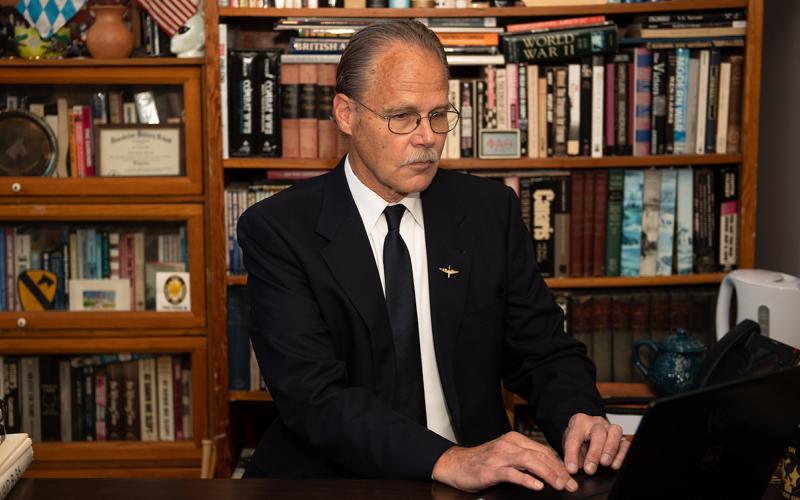Jessica Webb
editor@thesmokymountaintimes.com
Following national and international news coverage of the horrors of war in Ukraine over the past two weeks, the question at the forefront of my mind has been, Why? How does this benefit Russia? Why does Russian President Vladimir Putin want Ukraine, and why this approach to war that is causing such widespread destruction?
I posed these questions to Dr. David Dorondo, associate professor at Western Carolina University’s Department of History, when we spoke on Monday, March 7. Dorondo is in a unique position to understand and help explain the situation, as he served as a member of NATO energy security research task group, providing historical political context on the matter specifically for German-speaking Europe since the group was formed in 2019. He also happens to be teaching a history class “Russia and the West” this semester.
It turns out this kind of on-the-ground expansion and invasion of its neighbors is not a new approach for Russia.
“As I’ve said to my students, there’s a long tradition in Russian history going back centuries considering Russia and any of her neighbors; a recurrent theme; which when Russia follows it; leads to an expansion of the Russian state, whether it’s the Czar or the Soviet Union or post-Soviet Russia,” Dorondo explained.
Time and again, from the 17th century onward, the state has a history of pushing outward from Moscow to absorb its neighbors and ensure its continued leadership.
“We are now witnessing the current example of a Russian state attempting to re-establish control over a former part of what had been the Soviet Russian state during the Cold War—
Ukraine,” Dorondo said.
In recent history, we saw this approach play out in 2008 in Georgia, as well as in 2014 in Ukraine with the annexation of both Crimea and the Donbas region. Similarly, neighboring Belarus is effective already under Russian control. The Ukraine gained its independence in 1991.
“Ukraine is an interesting case because of the centuries-long association between Ukrainians and Russians where the religious, cultural, ethnic ties are very real and tightly woven,” Dorondo noted.
The country of about 44.5 million people is a quilt of multi-ethnic and multi-linguistic people, predominately Ukrainian and Russian. Some of the areas that have seen the greatest destruction are predominately Russian-speaking populations, a direct counter to Putin’s argument of wanting to protect the Russian-speaking people from the government of Ukraine.
Dorondo said it’s one of the biggest ironies so far. “A great many people who have been bombed out of their homes, killed, injured or orphaned have been Russian speakers,” he said.
Another aspect of this war that has been incredible to watch is the bravery of everyday Ukrainians and their commitment to fight against the invasion. Dorondo agrees it’s a remarkable phenomenon, and as a European historian, he said it’s the most current example of this kind of popular heroism that was seen in the same region in other times throughout history, such as during the Nazi invasion of WWII when millions took up arms to fight.
“They are showing this determination and grit not to be subjugated. If there was any question if Ukrainians were a separate people, I believe that has been answered,” he said.
Brutal approach
To many modern-day witnesses, Russia’s approach using a bulk of land forces showing brute military force and a willingness to induce numerous casualties both among its own troops and most tragically among civilians, seems both barbaric and outdated.
Unlike most western countries, Russia hasn’t deviated from this 20th century approach.
Despite the shocking nature of this approach, there have been several historical examples from Russia from Chechnya in 1999, where they used artillery and aerial bombardment that devastated the capital, and as Dorondo puts it, “quite literally bombed it to bits.”
More recently, during the Syrian Civil War, Russia sided with Bashar al-Assad and we saw this strategy again.
“We saw they were more than happy to implement this approach to war. The worst, of course, being against the ancient city of Aleppo, which again was indiscriminately bombed to bits.”
He fears this brutality will only continue to spread as Putin’s desperation to win the war grows.
But again, why?
“My students and observers have been asking me, why do this why? This indiscriminate bombing of civilians?” Dorondo said. “Part of that is to break the will of the Ukrainian resistance as rapidly as possible.”
From a military historian’s perspective, he believes there are three competing time lines including: how fast the West can reinforce Ukraine to continue fighting for themselves, how fast Russia can win the war, and how quickly pressure from the people of Russia will mount as the pain of sanctions and large numbers of fatalities among troops begins to sting.
Putin must win the war as rapidly and brutally as possible if he wants to avoid that rising pressure from the Russian people and risk not just losing the war but potentially losing his position of leadership entirely, Dorondo explained.
With a populace that lives under the constraints of the Kremlin, with its closed media and other challenges, a democratic way of life will likely appeal even more if the pains of waging war drag on.
Like us all, Dorondo continues to watch closely the events as they unfold in Ukraine, fearing for the Ukrainian people and hoping the conflict doesn’t escalate beyond its borders. He also has familial roots that go back to Russian-speaking Ukraine, further personalizing his work both with NATO and as a professor on the subject at Western Carolina University.
Ways to give to help the humanitarian crisis in Ukraine
https://www.unhcr.org/en-us/ The United Nations Refugee Agency
https://www.rescue.org/topic/ukraine-crisis The International Rescue Committee
https://support.crs.org/ Catholic Relief Services

